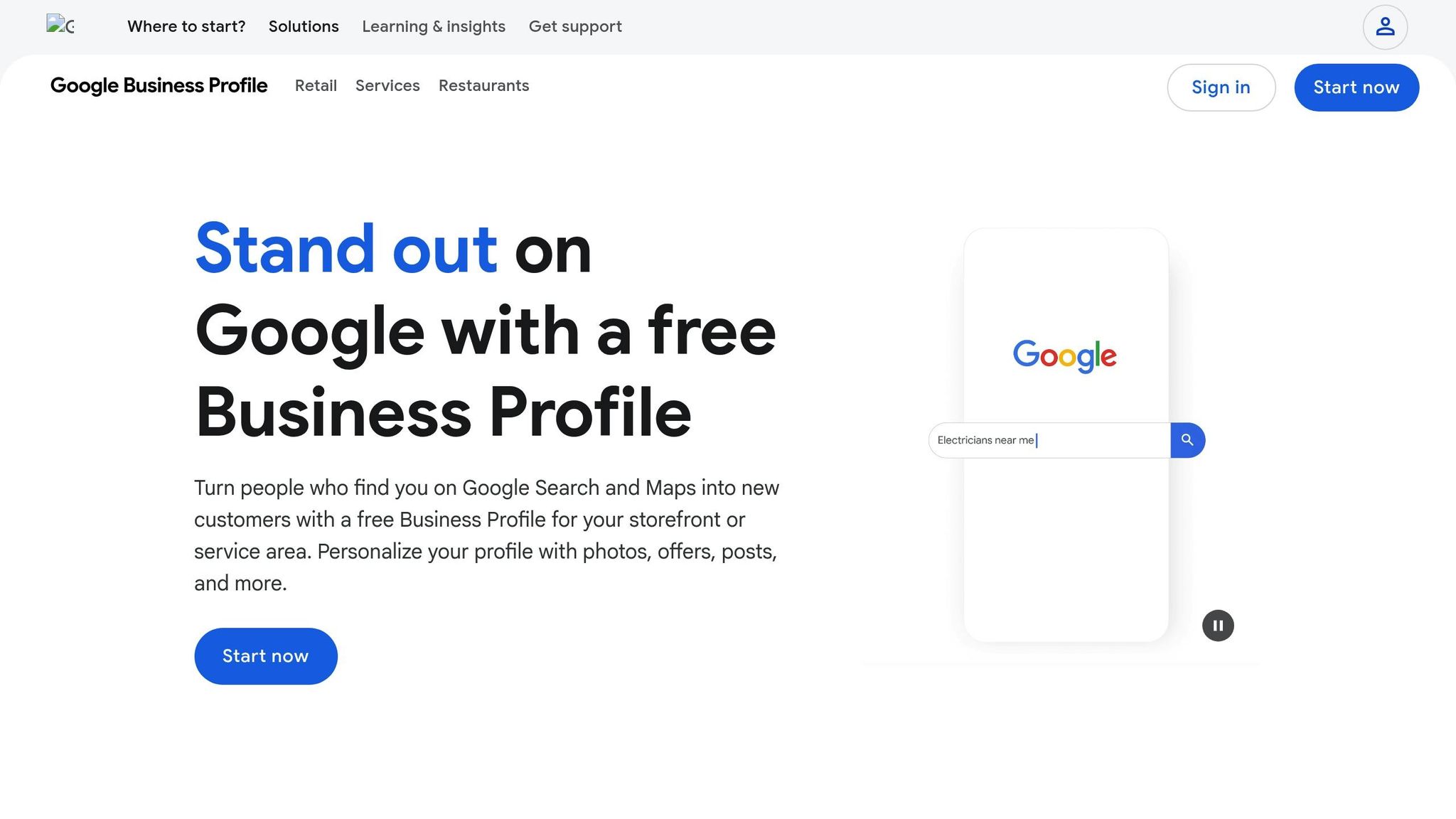If you're a chiropractor looking to attract more local patients, AI SEO software can help you rank higher on search engines without the hassle of manual SEO work. Here's how it works:
- Save time with automation: AI tools handle tasks like keyword research, content creation, and managing your Google Business Profile in minutes instead of hours.
- Improve local visibility: Use AI to find location-specific keywords and create targeted content that resonates with your community.
- Manage reviews effortlessly: AI can monitor and respond to patient reviews, keeping your online reputation strong.
- Track performance with data: AI dashboards provide insights on keyword rankings, website traffic, and patient inquiries, helping you adjust strategies effectively.
For just $49/month, platforms like Local SEO Bot offer tools to streamline your SEO efforts, so you can focus on patient care while boosting your online presence.
I Tested Webflow's New AI SEO Tool - Instant Schema & ChatGPT Optimization
Improving Google Business Profile with AI SEO Tools

A well-maintained Google Business Profile is key to enhancing local visibility. By leveraging AI SEO tools, businesses can streamline tasks like managing reviews - an essential aspect of maintaining a strong online reputation. This technology simplifies local SEO efforts, making them more efficient and effective.
Automating Review Management and Responses
AI SEO tools make it easy to monitor reviews across various platforms, including your Google Business Profile. They also help by generating timely responses to unanswered reviews, saving valuable time while ensuring consistent engagement with customers.
Finding High-Value Keywords for Local Chiropractic SEO
Once you’ve optimized your Google Business Profile, the next step is to zero in on keywords that can drive local engagement and attract more patients to your practice.
Targeted keywords are the backbone of patient acquisition. By using AI-powered SEO tools, you can sift through massive amounts of search data to uncover the exact terms people in your area use when searching for chiropractic care.
Researching Location-Based Keywords
AI tools are particularly effective at identifying location-specific keywords that connect your practice to nearby patients. These tools analyze search volume and competition for terms like "chiropractor in Dallas, TX" or "back pain treatment near me", helping you focus your efforts on phrases that matter most.
They also reveal local variations, such as neighborhood names or landmarks, to fine-tune your keyword strategy. For instance, if your practice is in Brooklyn, you might learn that people frequently search for terms like "chiropractor Park Slope" or "spinal adjustment Williamsburg", which could be more effective than broader city-wide terms.
Once you’ve gathered these location-based keywords, the next step is to dig into the intent behind those searches.
Understanding Search Intent
AI tools don’t just find keywords - they help you understand what patients are looking for. This is crucial because the intent behind a search can tell you whether someone is ready to book an appointment or simply gathering information.
For example, transactional keywords like "chiropractor near me" or "back pain relief chiropractor" indicate someone who’s ready to take action. On the other hand, informational keywords like "how often should I get a chiropractic adjustment?" show that the searcher is looking for guidance. Both types of keywords are valuable, but they serve different purposes. Informational queries help you build trust and showcase your expertise, while transactional ones are more likely to drive immediate appointments.
By categorizing keywords based on intent, you can create content that resonates with potential patients and moves them closer to scheduling care.
Adding Keywords to Content
Once you’ve identified your target keywords, the key is to integrate them naturally across your digital presence. AI tools can guide you on keyword placement and density to boost rankings without making your content feel forced or awkward.
For example, your Google Business Profile description is a great place to include primary local keywords. Instead of keyword stuffing, you might write something like, "Our downtown Seattle chiropractic clinic specializes in sports injury treatment and chronic back pain relief for active professionals."
Your website can also benefit from a thoughtful mix of primary and secondary keywords. Spread them across service pages, the about section, and blog posts. AI tools can even analyze your existing content and suggest additional keywords to incorporate. For instance, if your site already ranks for "chiropractor", adding a term like "neck pain specialist" to a related page could help you capture more search traffic.
The goal is to maintain a natural flow while emphasizing local relevance. AI tools can help strike this balance by analyzing successful examples in your market and recommending keyword variations that perform well.
sbb-itb-0e6533f
Automating Content Creation and Local Authority Building
Once your keyword strategy is ready, the next step is to harness AI to expand your online presence. By automating content creation, you can strengthen your digital footprint while dedicating more time to patient care.
The trick to making content automation work lies in blending efficiency with a personal touch. While AI can handle tasks like research, structuring, and drafting, it’s your expertise and local insights that make the content resonate with potential patients.
Creating Localized Website Content
AI tools can help generate localized blog posts, service pages, and FAQs tailored to your audience. These tools analyze local trends and craft content ideas that address real-world concerns.
For instance, in Phoenix, AI might suggest topics like managing back pain during scorching summers or dealing with desk job-related issues in Scottsdale. Content like this connects with readers because it speaks directly to their environment and lifestyle challenges.
You can also use AI to draft service pages for treatments such as spinal decompression or sports injury rehabilitation. Afterward, you can refine these drafts by adding your professional insights, such as success rates, typical treatment timelines, and real patient experiences from your practice.
AI tools are also great at maintaining a consistent brand voice and messaging across your website. This consistency not only enhances your site’s professionalism but also builds trust with visitors comparing your practice to others.
This localized content strategy can be expanded further by creating neighborhood-specific pages, which can significantly boost your local authority.
Building Neighborhood-Specific Landing Pages
Neighborhood-specific landing pages are a powerful way to enhance local SEO. Using your location-based keyword strategy, AI can efficiently create these targeted pages.
For example, AI can research demographic data, local landmarks, and health concerns specific to each area. A page for an upscale suburban neighborhood might highlight family wellness and preventive care, while one targeting a college town could focus on sports injury treatment and affordable payment options.
These pages also allow you to naturally incorporate location-based keywords, like "chiropractor in [neighborhood name]" or "[area] back pain treatment", without making the content feel awkward or repetitive. This approach helps your practice connect with local patients while improving search engine rankings.
Using AI for Local Citation Building
Local citations - mentions of your practice’s name, address, and phone number (NAP) across online directories - are crucial for improving local search rankings. AI tools simplify this often time-consuming process by ensuring accuracy and consistency across all platforms.
With AI-powered citation tools, you can identify relevant directories for healthcare providers in your region. These might include major platforms like Yelp and Healthgrades, as well as niche medical directories and local business listings. AI can automatically submit your practice’s information while maintaining consistent formatting - avoiding issues like "Street" versus "St." or missing suite numbers, which can confuse search engines and hurt your rankings.
These tools can also monitor your citations over time, notifying you of changes or new opportunities to enhance your listings. By keeping your citations updated, you maintain a strong local presence without constant manual effort.
Some AI platforms even suggest additional details to include in your citations, like business hours, accepted insurance plans, or specialization areas, making your listings more informative and appealing to potential patients browsing directory sites.
Tracking and Adjusting SEO Strategies with AI Data
Once your optimizations are live, AI tracking tools can take your SEO efforts to the next level. These tools rely on data to fine-tune your strategies, helping you achieve higher rankings faster. By focusing on precise metrics, you can identify what works best and make targeted adjustments to improve your results.
To truly measure success, prioritize metrics that directly impact patient growth. While it’s tempting to track every available data point, honing in on those tied to new patient acquisition gives you a clearer understanding of your SEO performance.
Monitoring Key Metrics with AI Dashboards
AI-powered dashboards simplify complex SEO data, turning it into actionable insights. These tools gather and organize data automatically, offering a clear snapshot of your online performance.
Your dashboard should monitor keyword rankings for terms like "chiropractor near me" or "back pain treatment [your city]." With AI tools, you can track these rankings daily, receive alerts for significant changes, and determine which strategies are driving results - and which ones need tweaking.
Another critical area to watch is your Google Maps visibility. AI dashboards can track how often your practice appears in the local map pack for various search terms and locations within your service area. This insight helps pinpoint where your local SEO efforts might need reinforcement.
Additionally, patient reviews provide valuable data about satisfaction and your online reputation. Metrics like bounce rate and session duration reveal how potential patients interact with your site. These insights feed directly into automated reporting, making it easier to refine your strategies over time.
Creating Automated Reports
Automated reports take the hassle out of manual data collection, highlighting key trends effortlessly. With AI-powered SEO tools, you can generate detailed monthly reports that focus on metrics most relevant to your practice’s goals.
These reports should cover essentials like keyword rankings, search volumes, traffic sources, impressions, clicks, conversions, phone calls, appointment requests, and overall new patient acquisition. They can also calculate your return on marketing investment, giving you a clearer picture of what’s working. By analyzing period-over-period trends, automated reports make it easier to spot opportunities for improvement and adjust your strategies accordingly.
Using Performance Data to Improve Strategies
The real power of AI SEO tracking lies in using data to drive better decisions. Instead of just collecting numbers, the most successful practices use this information to refine their content, target the right keywords, and allocate resources effectively.
For instance, if a keyword brings in a lot of traffic but few conversions, it could signal a disconnect between the searcher’s intent and your landing page. In this case, you might adjust your messaging or make your appointment booking process more prominent to address patient needs.
Performance data also helps you focus your time and budget on what truly works. If certain types of content consistently generate patient inquiries, you can prioritize those strategies to maximize your return on investment.
Conclusion: AI SEO Software as a Game-Changer for Chiropractors
AI SEO software has reshaped how chiropractic practices handle local search optimization, turning time-consuming manual tasks into efficient, automated processes. With tools for managing Google Business Profiles, responding to reviews, and tracking performance using data, these platforms deliver results far quicker than traditional SEO methods.
By automating repetitive tasks, your practice saves valuable time without losing that personal connection with patients. This efficiency allows you to focus on what truly matters - patient care and growing your practice. Platforms like Local SEO Bot take this a step further, offering a streamlined way to boost your online presence.
Local SEO Bot is a prime example of this automation revolution. For $49 per month, it provides a complete suite of tools, including Google Business Profile management, automated review responses, citation building, and ranking tracking. Everything is wrapped into one easy-to-use platform tailored for local businesses. These features not only simplify management but also give your practice a competitive edge in the local market.
The real advantage lies in the speed and flexibility these tools offer. By automating key processes, chiropractic practices can enhance their online visibility, track performance metrics, and adjust strategies in real-time. This adaptability leads to higher rankings on search engines and, ultimately, more patient appointments.
For chiropractors aiming to stand out in local search results, AI SEO software is more than just a tool - it’s a critical part of modern practice management. Adopting it now means tapping into more local search traffic and securing a stronger foothold in your community.
FAQs
How can AI SEO software help chiropractors boost their local search rankings?
AI SEO software can play a big role in boosting a chiropractic practice's visibility in local search results by simplifying and organizing key SEO tasks. For example, it can help you fine-tune your Google Business Profile, ensuring all the details are accurate and appealing to potential patients. This means everything from your hours of operation to service descriptions can be optimized to grab attention.
It also identifies keywords that matter most - those that align with what your target audience is searching for and local search patterns. On top of that, the software can automate content creation, making it easier to generate blog posts, service pages, and other materials that connect with your audience.
By using AI-powered insights, chiropractors can save time, draw in more local clients, and maintain a competitive edge in search rankings.
How can AI help chiropractors manage patient reviews and build a strong online reputation?
AI offers chiropractors an efficient way to manage patient reviews and maintain a strong online reputation. With AI tools, practices can track reviews automatically across various platforms, spot trends quickly, and respond to feedback professionally and promptly. This approach helps build trust with both current patients and those considering the practice.
Beyond monitoring, AI can also analyze review data to highlight recurring patient concerns or pinpoint areas that might need improvement. By automating these processes, chiropractors save valuable time while maintaining a consistent and proactive approach to managing their reputation - an effort that can lead to attracting more local patients.
How can understanding search intent improve a chiropractic practice's SEO strategy?
Understanding search intent is key for chiropractic practices aiming to connect with potential patients effectively. When your website and content address what people are actively searching for - whether it’s tips for managing pain, information on treatment options, or finding a chiropractor nearby - you’re more likely to show up in search results and attract the right audience.
By aligning your content with these needs, you’re not just improving your SEO; you’re also showing patients that you truly get what they’re looking for. This builds trust and positions your practice as a reliable source for solutions. Plus, focusing on search intent can give you a competitive edge in local search rankings, making it easier to turn curious visitors into long-term patients.


